#literary term
Explore tagged Tumblr posts
Text
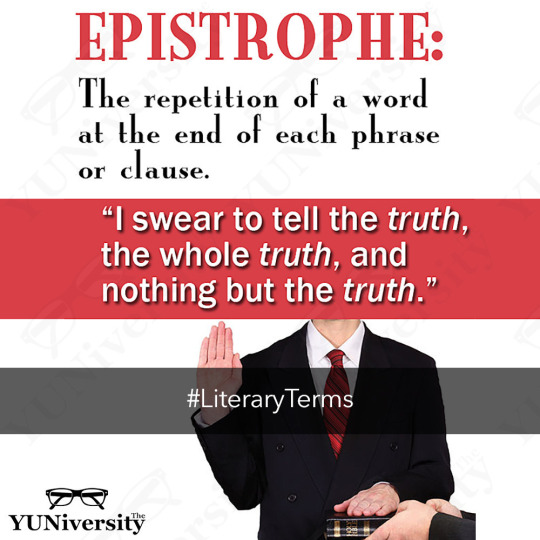

Website | Twitter | Instagram | Medium | Pinterest | Ko-fi | eBook
27 notes
·
View notes
Text














Mal's Teen Wolf rewatch: Visionary (3x08)
#twrewatch#teen wolf#cora hale#stiles stilinski#stora#gifs#teenwolfedit#twedit#corahaleedit#stilesstilinskiedit#storaedit#useramys12#tuserbelovas#tusercatherine#addys-beth#userbecca#userdanahscott#teendramaedit#userthing#look at stiles referencing literary terms#just posting gifs of me on tumblr no big deal
465 notes
·
View notes
Text
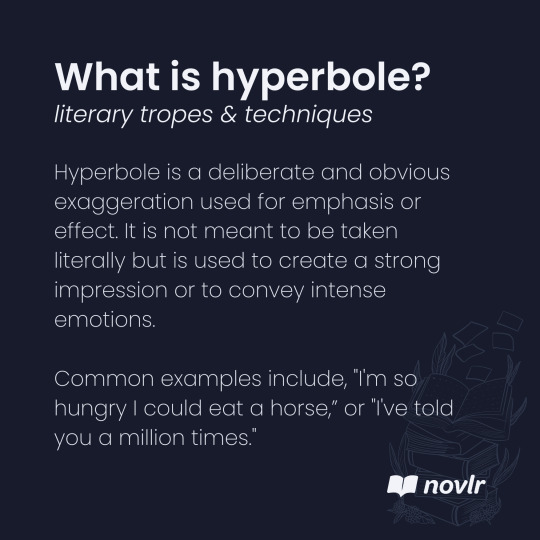
#literary devices#writing terms#writing tropes#writers#creative writing#writing#writing community#writers of tumblr#creative writers#writing inspiration#writeblr#writerblr#writing tips#about writing#writing stuff#tropes#literary terms#literary techniques#literary device#let's write#how to write#helping writers#writer#writers on tumblr#writing advice#writing resources#writers and poets#writing help#help for writers#tips for writers
819 notes
·
View notes
Text
Some Literary Terms & Devices

Literary devices and terms - are the techniques and elements that writers use to create narrative literature, poetry, speeches, or any other form of writing.
Anadiplosis - a figure of speech in which a word or group of words located at the end of one clause or sentence is repeated at or near the beginning of the following clause or sentence. This line from the novelist Henry James is an example of anadiplosis: "Our doubt is our passion, and our passion is our task."
Bildungsroman - a genre of novel that shows a young protagonist's journey from childhood to adulthood (or immaturity to maturity), with a focus on the trials and misfortunes that affect the character's growth.
Chiasmus - a figure of speech in which the grammar of one phrase is inverted in the following phrase, such that two key concepts from the original phrase reappear in the second phrase in inverted order. The sentence "She has all my love; my heart belongs to her," is an example of chiasmus.
Diacope - a figure of speech in which a word or phrase is repeated with a small number of intervening words. The first line of Anna Karenina by Leo Tolstoy, "Happy families are all alike; every unhappy family is unhappy in its own way," is an example of diacope.
Epizeuxis - a figure of speech in which a word or phrase is repeated in immediate succession, with no intervening words. In the play Hamlet, when Hamlet responds to a question about what he's reading by saying "Words, words, words," that's an example of epizeuxis.
Foreshadowing - a literary device in which authors hint at plot developments that don't actually occur until later in the story. Foreshadowing can be achieved directly or indirectly, by making explicit statements or leaving subtle clues about what will happen later in the text. The Russian author Anton Chekhov summarized foreshadowing when he wrote, "If you say in the first chapter that there is a rifle hanging on the wall, in the second or third chapter it absolutely must go off." The description of the gun on the wall, in other words, should foreshadow its later use.
Hubris - excessive pride or overconfidence, which drives a person to overstep limits in a way that leads to their downfall. In Greek mythology, the legend of Icarus involves an iconic case of hubris: Icarus is given artificial wings made of wax and feathers so that he can fly (a superhuman feat), but he ignores his father's warnings and flies too close to the sun, melting his wings and drowning in the ocean.
Irony - a literary device or event in which how things seem to be is in fact very different from how they actually are. If this seems like a loose definition, don't worry—it is. Irony is a broad term that encompasses three different types of irony, each with their own specific definition: verbal irony, dramatic irony, and situational irony. Most of the time when people use the word irony, they're actually referring to one of these specific types of irony.
Juxtaposition - occurs when an author places two things side by side as a way of highlighting their differences. Ideas, images, characters, and actions are all things that can be juxtaposed with one another. For example, it's a common plot device in fairy tales such as Cinderella to juxtapose the good-natured main character with a cruel step-sibling. The differences between the characters, as well as their close relation to one another, serve to highlight the main character's good qualities.
Kenning - a figure of speech in which two words are combined in order to form a poetic expression that refers to a person or a thing. For example, "whale-road" is a kenning for the sea. Kennings are most commonly found in Old Norse and Old English poetry.
Litotes - a figure of speech and a form of understatement in which a sentiment is expressed ironically by negating its contrary. For example, saying "It's not the best weather today" during a hurricane would be an example of litotes, implying through ironic understatement that the weather is, in fact, horrible.
Metonymy - a type of figurative language in which an object or concept is referred to not by its own name, but instead by the name of something closely associated with it. For example, in "Wall Street prefers lower taxes," the New York City street that was the original home of the New York Stock Exchange stands in for (or is a "metonym" for) the entire American financial industry.
Narrative - an account of connected events. Two writers describing the same set of events might craft very different narratives, depending on how they use different narrative elements, such as tone or point of view. For example, an account of the American Civil War written from the perspective of a white slaveowner would make for a very different narrative than if it were written from the perspective of a historian, or a former slave.
Onomatopoeia - a figure of speech in which words evoke the actual sound of the thing they refer to or describe. The “boom” of a firework exploding, the “tick tock” of a clock, and the “ding dong” of a doorbell are all examples of onomatopoeia.
Polyptoton - a figure of speech that involves the repetition of words derived from the same root (such as "blood" and "bleed"). For instance, the question, "Who shall watch the watchmen?" is an example of polyptoton because it includes both "watch" and "watchmen."
Quatrain - a four-line stanza of poetry. It can be a single four-line stanza, meaning that it is a stand-alone poem of four lines, or it can be a four-line stanza that makes up part of a longer poem.
Red herring - a piece of information in a story that distracts readers from an important truth, or leads them to mistakenly expect a particular outcome. Most often, the term red herring is used to refer to a "false clue"—a piece of evidence that misleads readers to believe that a crime (or other action) was committed by someone other than the actual culprit.
Sibilance - a figure of speech in which a hissing sound is created within a group of words through the repetition of "s" sounds. An example of sibilance is: "Sadly, Sam sold seven venomous serpents to Sally and Cyrus in San Francisco."
Theme - a universal idea, lesson, or message explored throughout a work of literature. One key characteristic of literary themes is their universality, which is to say that themes are ideas that not only apply to the specific characters and events of a book or play, but also express broader truths about human experience that readers can apply to their own lives. For instance, John Steinbeck's The Grapes of Wrath (about a family of tenant farmers who are displaced from their land in Oklahoma) is a book whose themes might be said to include the inhumanity of capitalism, as well as the vitality and necessity of family and friendship.
Understatement - a figure of speech in which something is expressed less strongly than would be expected, or in which something is presented as being smaller, worse, or lesser than it really is. Typically, understatement is used to call attention to the very quality it pretends to downplay. For instance, if you had just eaten the most delicious meal of your life and licked the plate clean, you might jokingly tell the chef that "It was edible," making use of understatement to humorously express how much you appreciated the meal.
Verbal irony - occurs when the literal meaning of what someone says is different from—and often opposite to—what they actually mean. When there's a hurricane raging outside and someone remarks "what lovely weather we're having," this is an example of verbal irony.
Zeugma - a figure of speech in which one "governing" word or phrase modifies two distinct parts of a sentence. Often, the governing word will mean something different when applied to each part, as in the sentence, "He took his coat and his vacation." The verb "to take" makes sense with and governs both "coat" and "vacation," but is appropriate to each in a different way.
Source ⚜ More: Writing Notes & References
#literary terms#poetry#writeblr#writing reference#spilled ink#dark academia#studyblr#light academia#literature#writers on tumblr#writing prompt#langblr#poets on tumblr#creative writing#writing inspiration#writing inspo#writing ideas#nicholas roerich#art#book#booklr#writing resources
159 notes
·
View notes
Text

#My target audience (me) has been reached#“Pied” is the French literary term for a syllable in a poem#literature#french literature#victor hugo#les contemplations
59 notes
·
View notes
Note
So i had a thought while writing my comment for the latest chapter.
Is the fight between Red and Helsknight going to be the end of the fic? Is Martyn going to listen to Tanguish and then tell the Knight that it's his squires fault for why his blood is on the sand?
How would Red react, how would any of them react, if they killed the Champion of Hels?
Maybe Tanguish tries to bring him back, thus fully becoming a saint in his own right and separating from his hermit completely. Maybe he becomes a saint of protection and facing your fears and learning remora behavior?
Anyways really love the fic and the little side chapters we get!
🎤
#rns asks#nyxcentury#a lot of thoughts#i dont necessarily want to answer them#because i think theyre good questions to ask#i will say though: Red and Helsknight's fight is... a rising action i think#if i had to pick a literary term#there is at least one more climax planned for the fic#depending on what you would label a climactic moment there are possibly two
29 notes
·
View notes
Text
Literary Terms with The Owl House

Simile: a comparison using like or as. (Eda: "He is like a little teakettle")
28 notes
·
View notes
Text
I wish people would stop calling Katniss an "unreliable narrator" and call her a "limited narrator" instead.
Either every first-person book has an unreliable narrator, or Katniss Everdeen is a limited, not unreliable, narrator. She does not ever try to lie or deceive the audience or hide information. There is no evidence of her having delusions or making up events. Everything she says is how she actually perceives what is going on. Which limits our information on others' thoughts and motivations and what they're doing behind Katniss's back, but it does not make her unreliable.
#the hunger games#katniss everdeen#literary terms are important#also i think i'm making up the term limited narrator for first person#limited third person exists#i think most literary analysis just says it's first person and people get that is going to limit the information & interpretation we receiv#but so many people are calling katniss unreliable that i'm going to start calling her a limited narrator if need be
371 notes
·
View notes
Text
Blyke and John: the Followup
In my last entry, I pointed out the similarities between chapters 249 and 121, but I had hit the image limit and wasn’t able to embed screenshots. I got around this by linking the chapters, but this is probably my favorite parallel, and to do it justice I think I need to really put them next to each other.
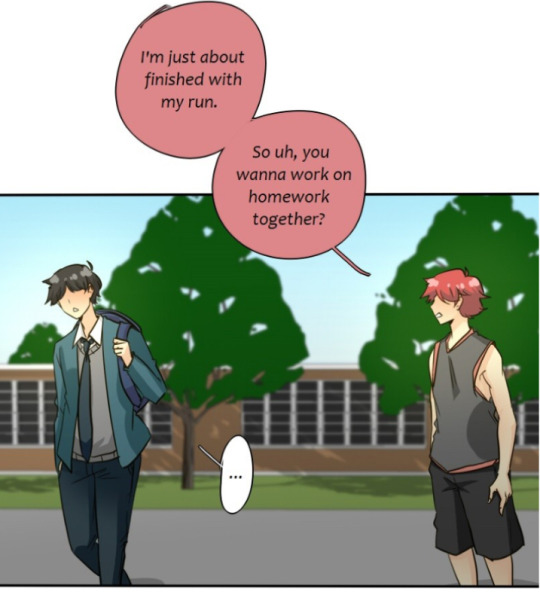
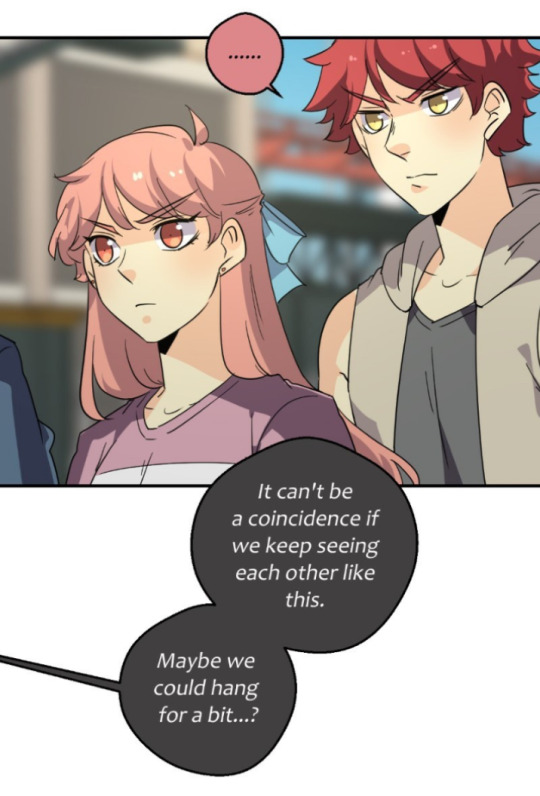
(121) (249)
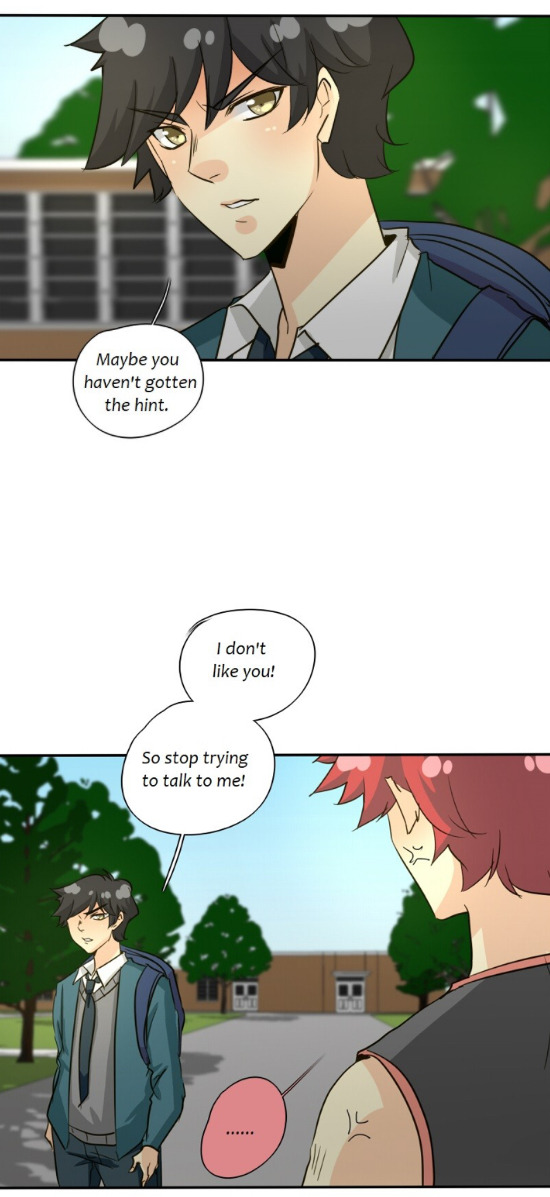
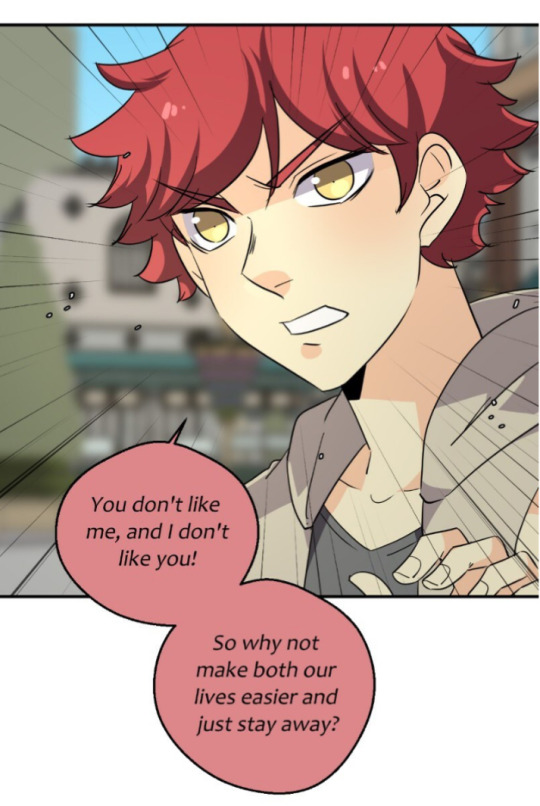
(121) (249)
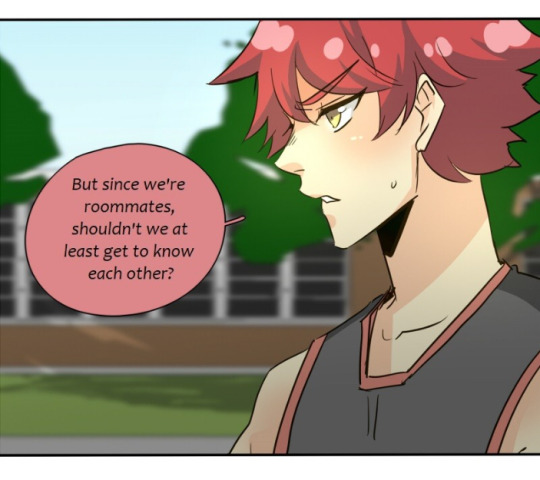
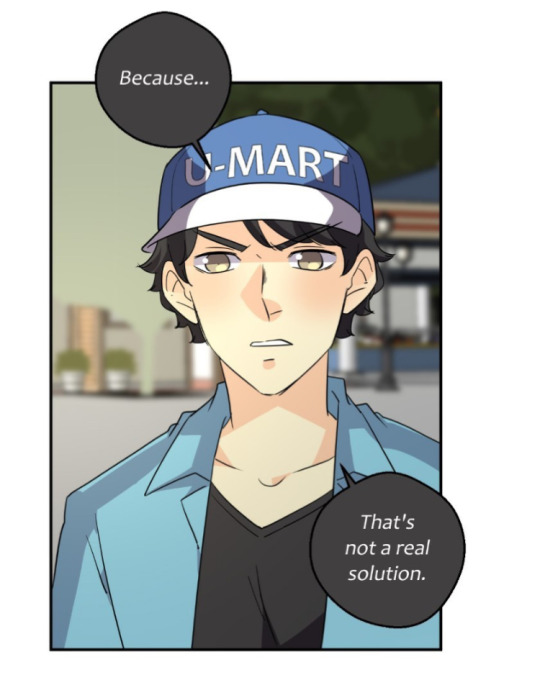
(121) (249)
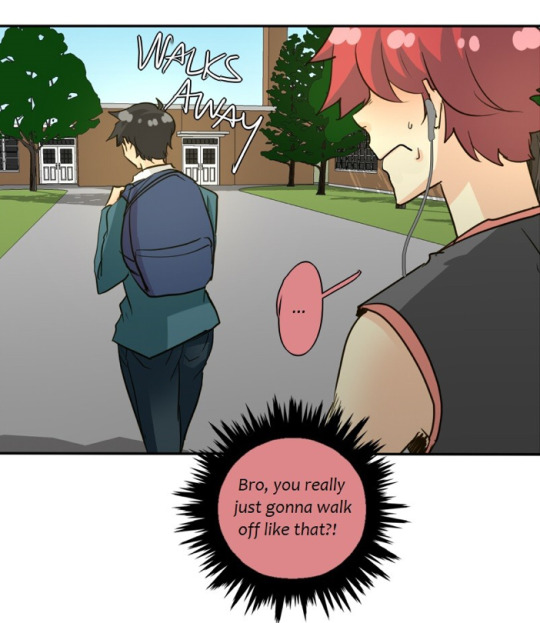
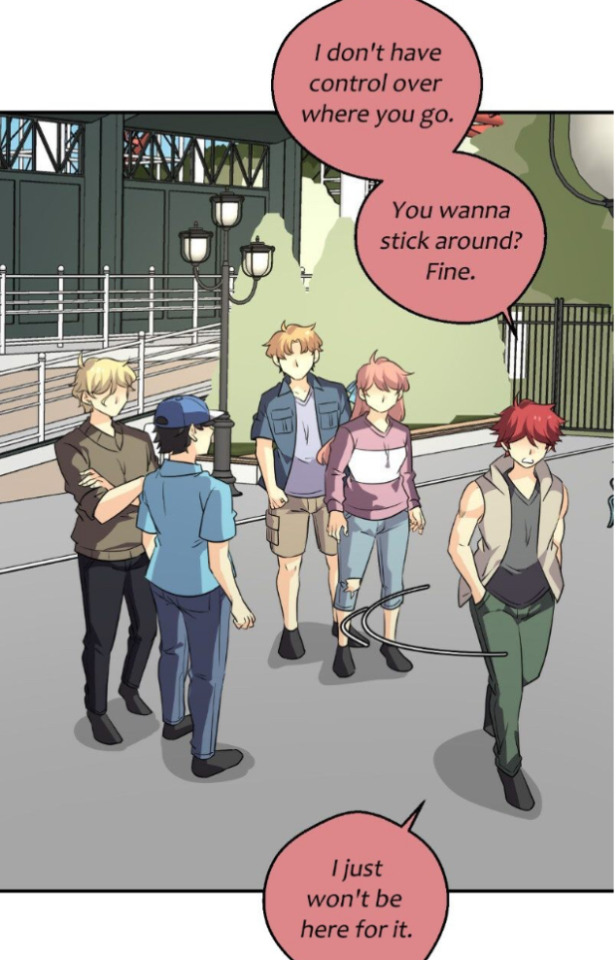
(121) (249)
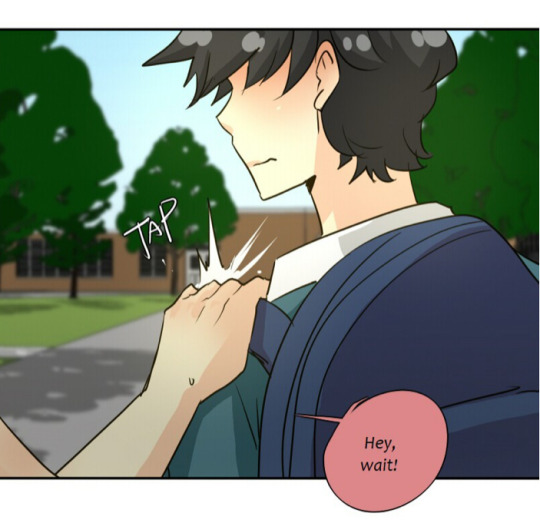
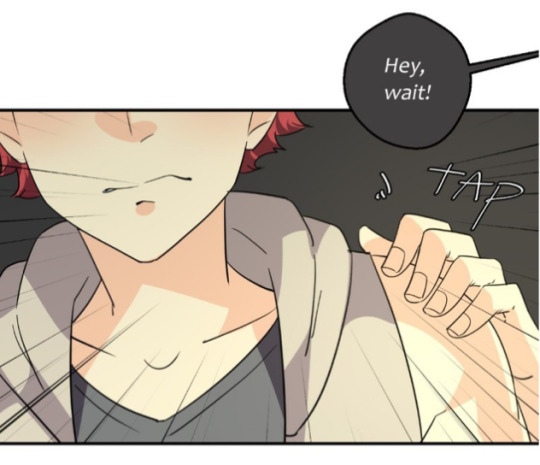
(121) (249)
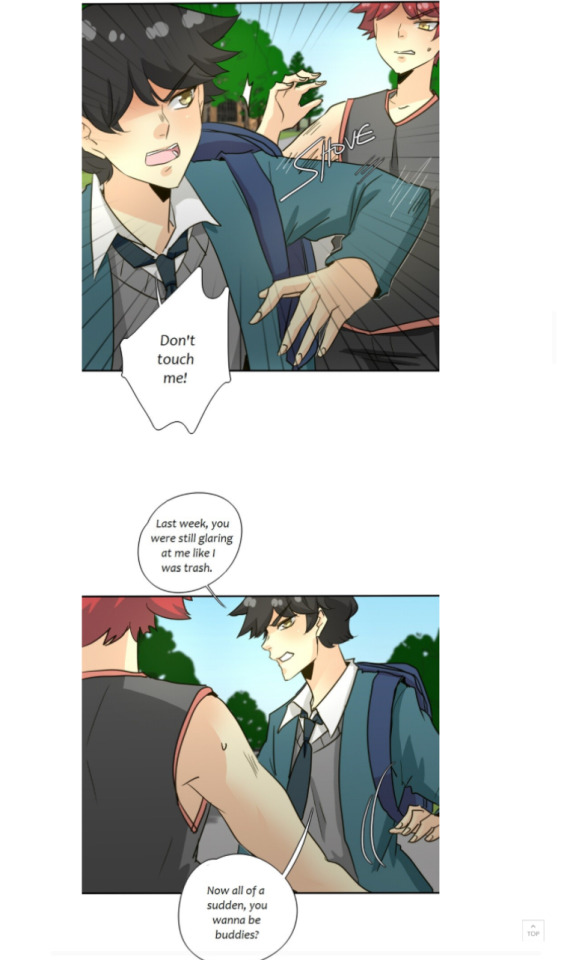
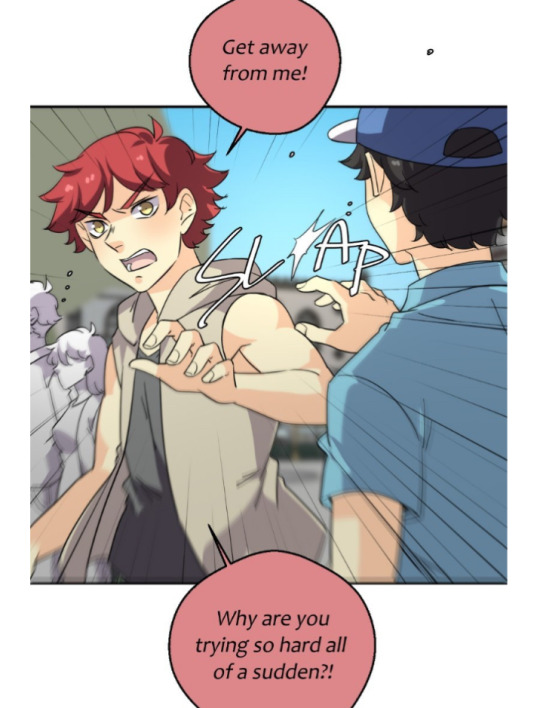
(121) (249)
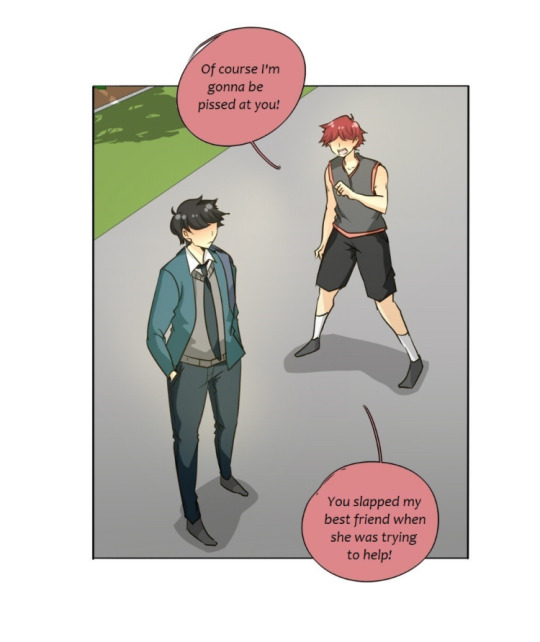
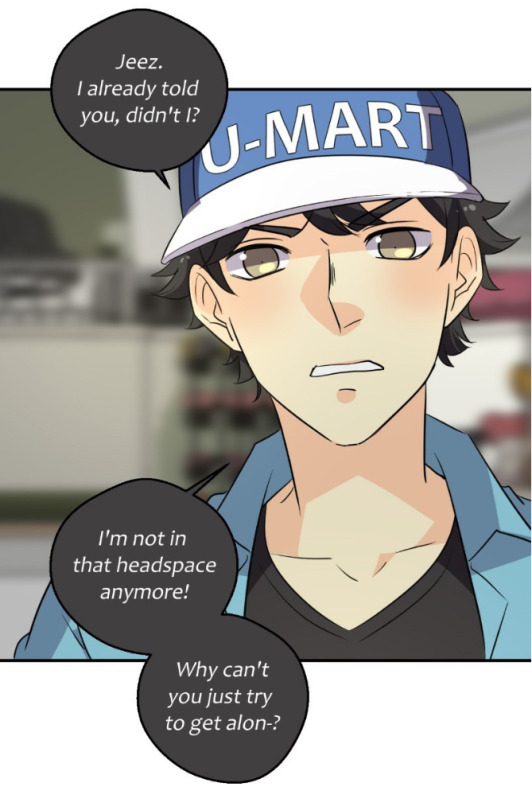
(121) (249)


(121) (249)
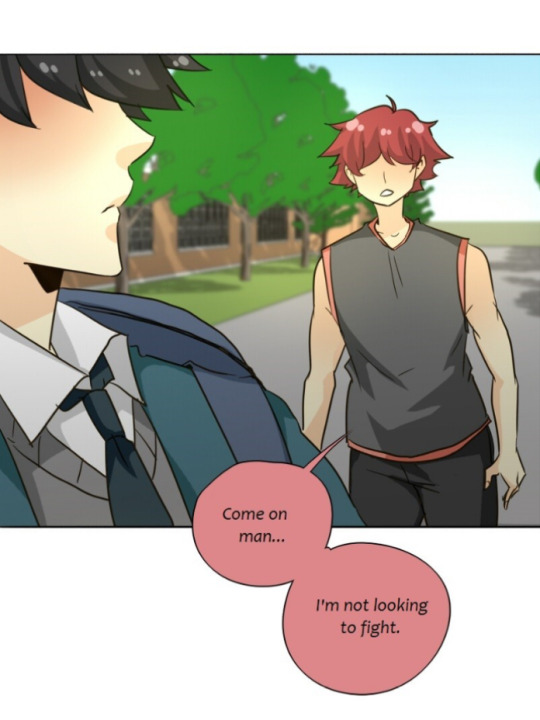
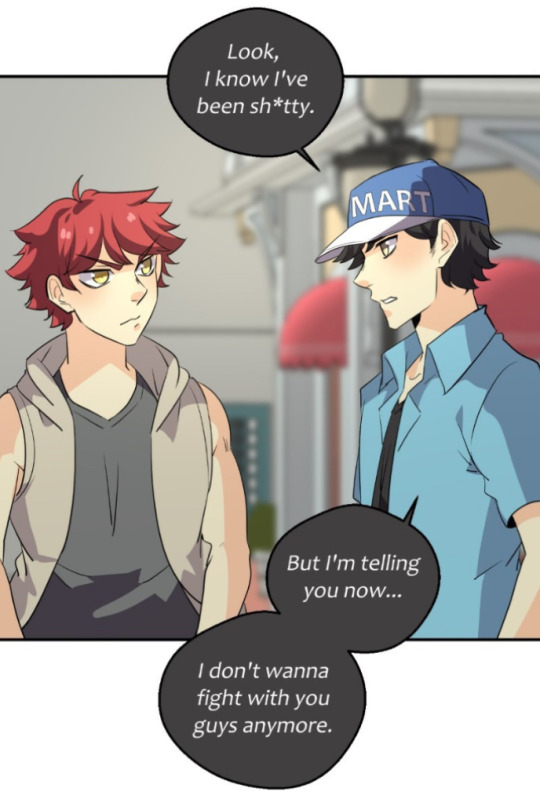
(121) (249)
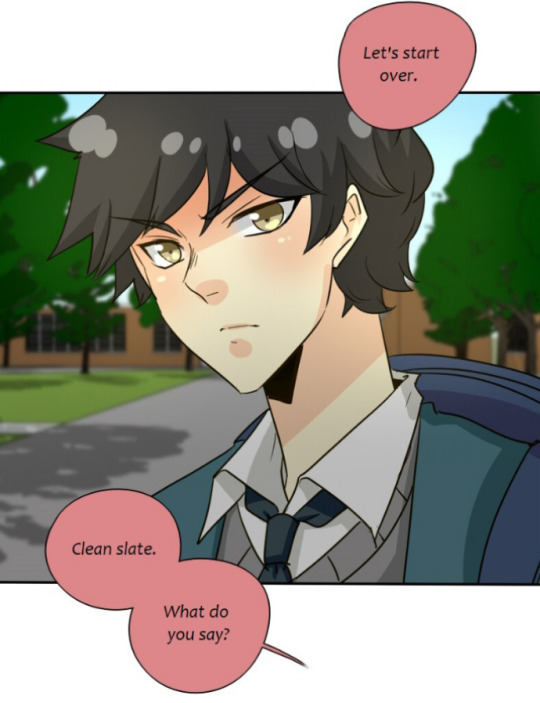
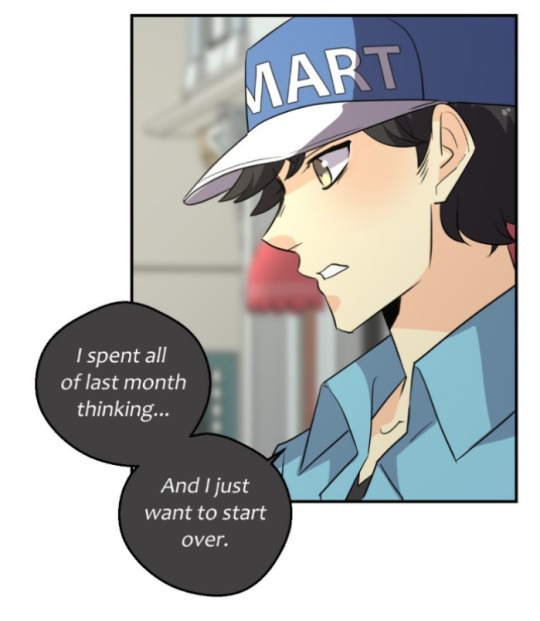
(121) (249)
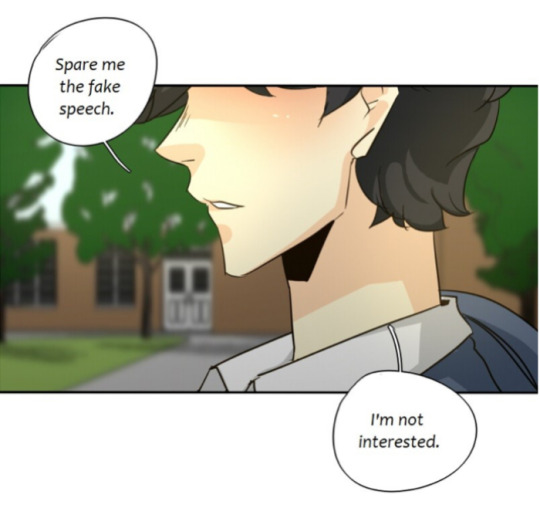
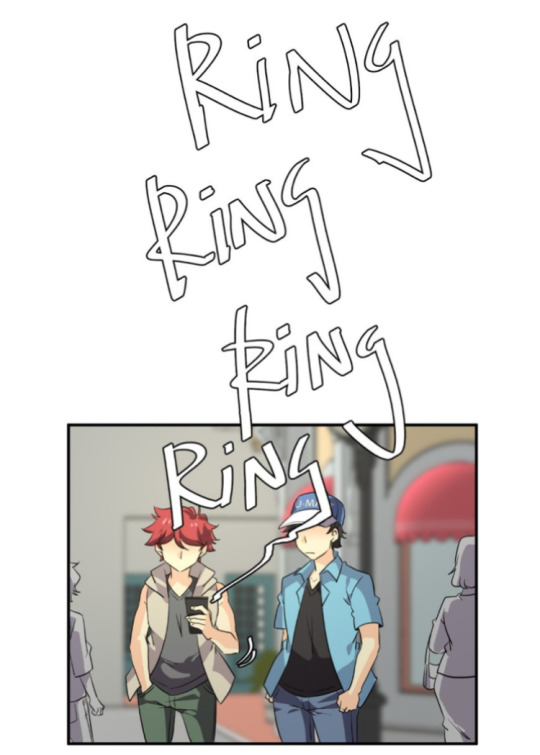
(121) (249)
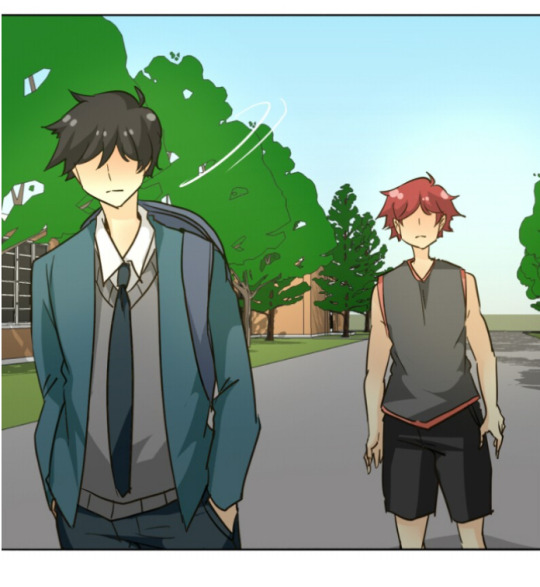
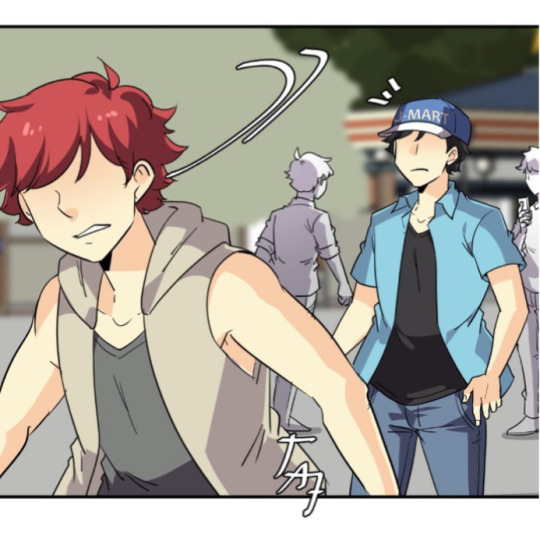
(121) (249)
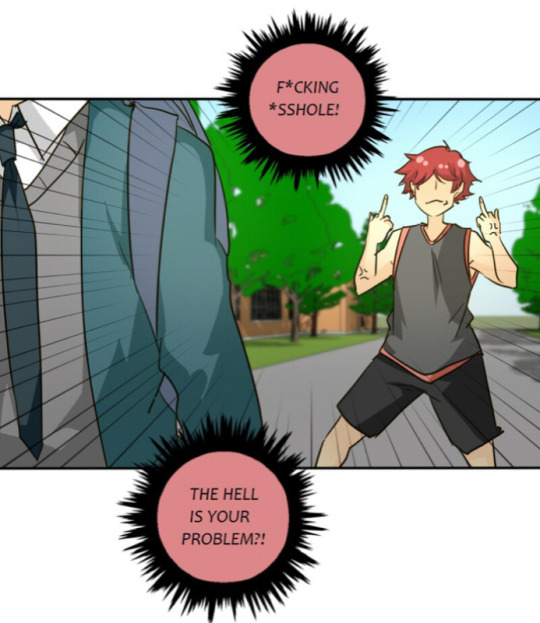
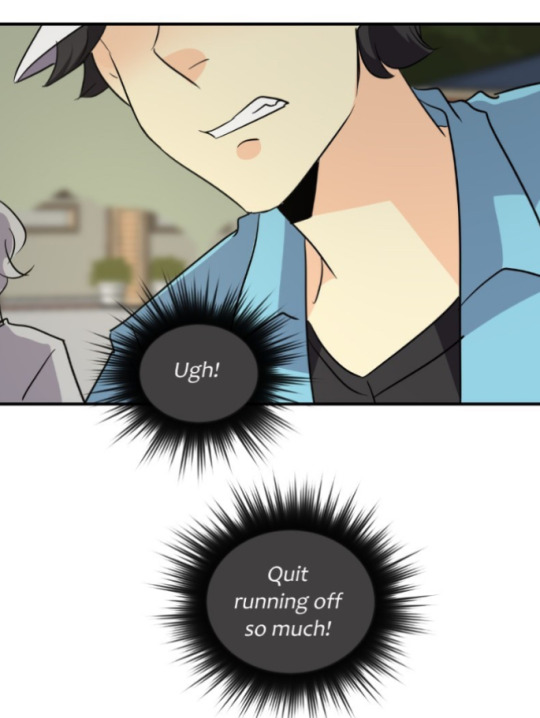
(121) (249)
It’s the same fucking scene but backwards and in a different font.
They’re the SAAAAAAAAAAME!!!!!!!!
This was definitely on purpose. Shit like this ^^ doesn’t happen by accident.
#unordinary#blyke unordinary#john unordinary#you know you’re deep in when you think you’re editing your draft and you’re wondering why the pictures are formatted all weird#Then you scroll down and realize you’re looking at the actual episode#i clicked the wrongfucking tab#T_T#I’m actually insane because when I first realized how similar Blyke and John are I denied it#I was like “nah but they’re nothing alike”#what was I on#girl wtf#AND NOW IVE MADE FIVE WHOLE ENTRIES ABOUT IT#I don’t think i’ve ever made more than one entry about a topic before#The most boldfaced lie i ever did tell myself apparently#Analysis#Blyke and John parallels#i can’t believe i just made an actual tag for that#How many times am I gonna write about this?#this one better be the last#But Really I’ve got no idea what essays my future brain has in store#Speaking of which. Essays is apparently the proper term for what I make#I’ve been calling them “little literary analyses”#which is also true#but I was trying to find a term for fan-nonfiction#nonfiction fanwork#like this#meta#and my brother was like: “you mean an essay?”#Yeah i guess that is what I mean#I like fan-nonfiction better though
41 notes
·
View notes
Text
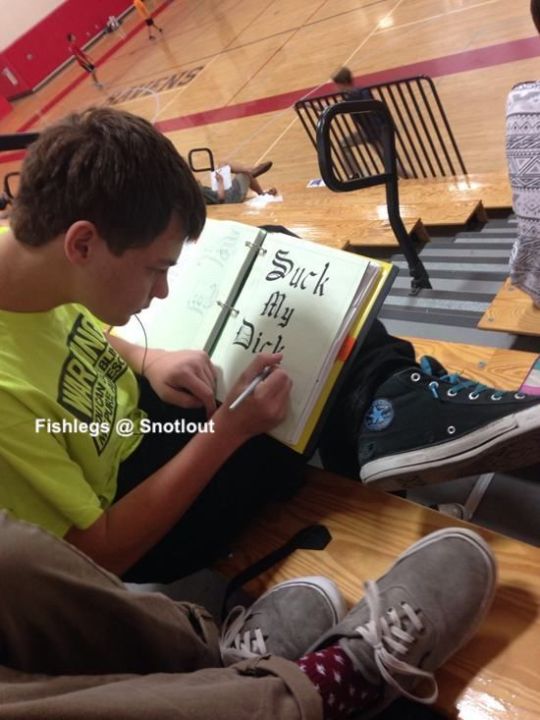


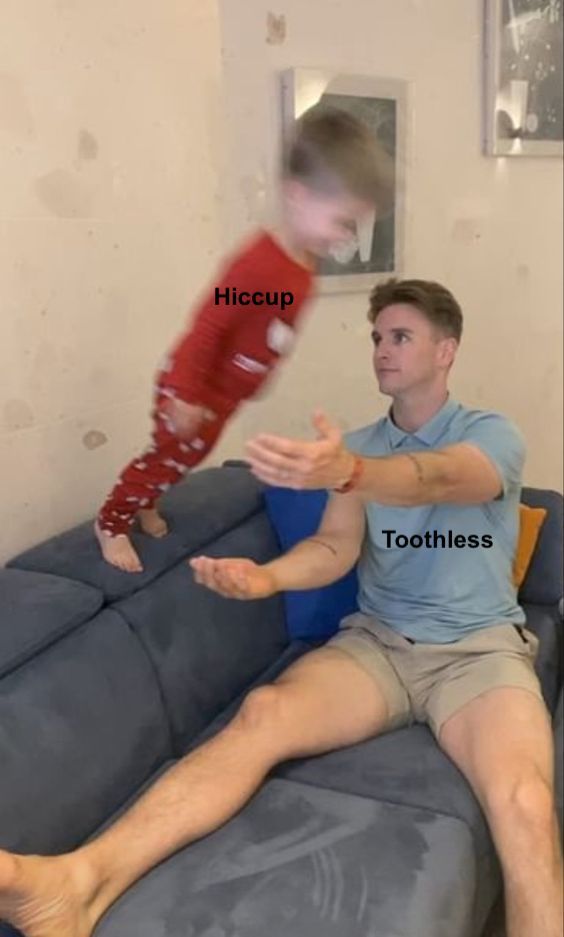
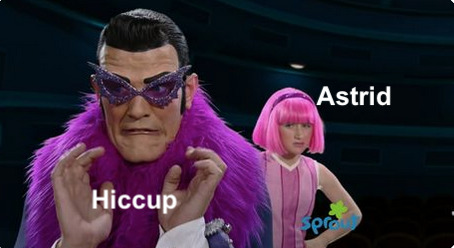
behold.
#that was very commanding of me#i have just spent the last hour explaining my knowledge of dragons to myself#and then i started on literary terms#then i got bored of my own rabbit hole#so i made these#every day i face the looming threat of becoming an english major#httyd#httyd memes
200 notes
·
View notes
Text

I knew a few of these, including the rather beautiful “petrichor”, but I’m reeling from the knowledge that I’m overly fond of interrobangs and that I can legitimately write a sentence like “Cassian Andor had a permanently wrinkled glabella when he was stressed, which was most of the time” - and get away with it. 
#names for things you never knew had names#writing#vocabulary#literary terms#writers on tumblr#writing!#fic writing#cassian andor#writing tips
19 notes
·
View notes
Text

“Anadiplosis” is a rhetorical device in which the last word of a preceding line begins the next line.
In the picture, part of the lyrics to The Wanted’s “Glad You Came,” we can see this in action. 👍

Website | Twitter | Instagram | Medium | Pinterest | Ko-fi | eBook
#anadiplosis#AP Language#AP Lang#literary term#rhetorical device#English class#English#learning English#The Wanted#Glad You Came
9 notes
·
View notes
Text

Hello friends! This is what we call projection!!
#dean winchester#spn#supernatural#dean#news flash#dean isn't 'mother coded'#being parentified has no gender#I'm taking the literary term coding#and putting it up on a shelf until y'all learn how to properly use it#or at least learn the fucking history of it#and WHY characters had to be coded#(because of censorship that's literally the whole reason)#Dean stans take ONE English class PLEASE#pro-Dean Winchester#anti-Dean stans#because their characterization of Dean is at least 90% projection#op
16 notes
·
View notes
Text
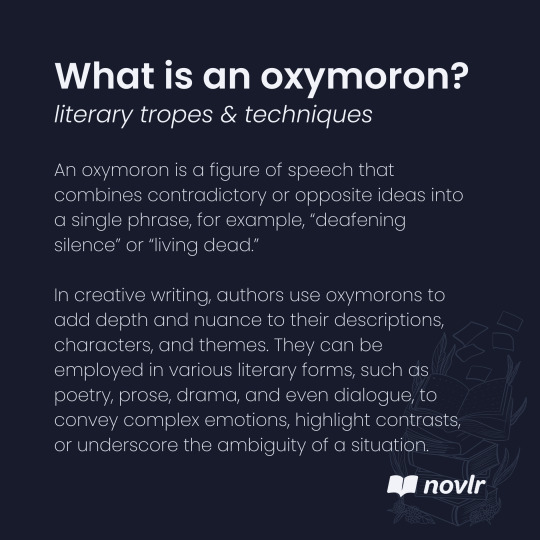
#oxymoron#literary tropes#literary techniques#literary terms#literary device#writers#creative writing#writing#writing community#writers of tumblr#creative writers#writing inspiration#writeblr#writerblr#writing tips#writblr#writers corner#writers on tumblr#tumblr writing community#helping writers#tips for writers#writing advice#writing help#writer#writing resources#writers and poets#writing stuff#on writing#writer stuff
83 notes
·
View notes
Text
more literary terms
Asyndeton: The omission of a conjunction from a list ('chips, beans, peas, vinegar, salt, pepper').
Elision: The omission of one or more letters or syllables from a word. This is usually marked by an apostrophe: as in 'he's going to the shops'.
Feminine Rhyme: a rhyme of two syllables in which the final syllable is unstressed ('mother | brother'). If an iambic pentameter ends in a feminine rhyme the last, unstressed, syllable is usually not counted as one of the ten syllables in the line ('To be or not to be, that is the question' - the 'ion' is unstressed and takes the line into an eleventh syllable). Feminine rhyme can be used for comic effect, as it is frequently in the works of Byron: 'I've spent my life, both interest and principle, | And think not what I thought, my soul invincible.' It can also be sometimes used to suggest a feminine subject-matter, as in Shakespeare's Sonnet 20, which is addressed to the 'master mistress of my passion' and which makes extensive use of 'feminine' rhymes.
Polysyndeton: The use of multiple conjunctions, usually where they are not strictly necessary ('chips and beans and fish and egg and peas and vinegar and tomato sauce').
Topos: from a Greek word meaning 'place', a 'topos' in poetry is a 'commonplace', a standard way of describing a particular subject. Describing a person's physical features from head to toe (or somewhere in between) is, for example, a standard topos of medieval and Renaissance poetry.
If these writing notes helped with your poem/story, please tag me. Or leave a link in the replies. I'd love to read them!
Literary Terms pt. 1 ⚜ More: Word Lists
#writing prompt#writeblr#writers on tumblr#poets on tumblr#literature#poetry#literary terms#writing inspiration#words#writing reference#writing resources#writing notes#terminology#been overusing asyndeton and polysyndeton in my writings for years#langblr#studyblr#dark academia
103 notes
·
View notes
Text
Hey I'm feeling chill and Sneepy so I don't want to get into it tonight but someone remind me tomorrow how today I learned about the term "literary junk food" through someone online LAMENTING about how it makes them STARVED FOR REAL STIMULATION.
I have a lot to say about that and my take on it. If I were to summarize it in a physicality it would be a roll of the eyes, a blown raspberry to simulate a fart sound, and then just me turning around and walking out of the virtual room.
#I saw someone say literary junk food is more like enjoyment without effort#That's a better definition#Still not crazy about the term#But yes that is for future Clove
15 notes
·
View notes